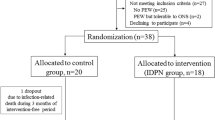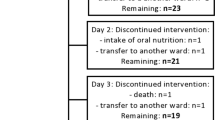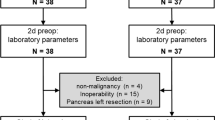Abstract
Background:
The metabolic response to surgery includes alterations in protein metabolism, resulting in a net loss of proteins. Protein hypercatabolism is considered an unavoidable consequence of injury, and an important source of morbidity and mortality. Our purpose was to determine the effect of nutrition on protein metabolism following gastrointestinal surgery, and to elucidate whether postoperative protein loss can be prevented with adequate nutritional support.
Methods:
Patients who had undergone gastrointestinal surgery were given four different parenteral nutritions with increasing glucose, lipid and amino acid content during the 7 days following surgery. Nitrogen balance, protein synthesis and protein breakdown were determined using in vivo stable isotope labelling. Other metabolites (3-methylhistidine, creatinine, urea, cortisol, glucose, insulin, amino acids and C-reactive protein) were measured.
Results:
A nutrition-dependent alteration of protein metabolism was found in response to surgical injury. Nutrition modified nitrogen balance, whole-body protein breakdown and, to a lesser extent, whole-body protein synthesis and muscle protein breakdown. The low-energy parenteral nutrition without amino acids produced a negative nitrogen balance (postoperative day 7=−0.381 g protein kg−1day−1) and important alterations in postoperative protein metabolism that did not normalize during the study period (day 7 protein synthesis=239% and protein breakdown 217% vs preoperative). Patients receiving the two low energy parenteral nutritions containing amino acids had a less negative nitrogen balance (day 7=−0.011 and −0.133 g protein kg−1day−1) and a transient increase in protein metabolism. The complete parenteral nutrition maintained, during all studied days, protein metabolism parameters within the preoperative reference range (synthesis day 2=92%, day 4=110% day 7=79%; breakdown day 2=85%, day 4=80%, day 7=76% vs preoperative) and a positive nitrogen balance (day 2=+0.0387, day 4=+0.578 and day 7=+0.227 g protein kg−1day−1).
Conclusion:
Complete nutritional support can prevent protein loss after gastrointestinal surgery and maintain protein metabolism without alterations.
This is a preview of subscription content, access via your institution
Access options
Subscribe to this journal
Receive 12 print issues and online access
$259.00 per year
only $21.58 per issue
Buy this article
- Purchase on Springer Link
- Instant access to full article PDF
Prices may be subject to local taxes which are calculated during checkout



Similar content being viewed by others
References
Arnal M, Obled C, Attaix D, Patureau-Mirand P, Bonin D (1987). Dietary control of protein turnover. Diabetes Metab 13, 630–642.
ASPEN Board of Directors (1993). Guidelines for use of parenteral and enteral nutrition in adult and pediatric patients. J Parenter Enteral Nutr 17 (Suppl), S15–S16.
Basse L, Raskov HH, Hjort Jakobsen D, Sonne E, Billesbolle P, Hendel HW et al. (2002). Accelerated postoperative recovery programme after colonic resection improves physical performance, pulmonary function and body composition. Br J Surg 89, 446–453.
Basse L, Thorbol JE, Lossl K, Kehlet H (2004). Colonic surgery with accelerated rehabilitation or conventional care. Dis Colon Rectum 47, 271–277, discussion 277–278.
Bier DM (1989). Intrinsically difficult problems: the kinetics of body proteins and amino acids in man. Diabetes Metab Rev 5, 111–132.
Carli F, Webster J, Ramachandra V, Pearson M, Read M, Ford GC et al. (1990). Aspects of protein metabolism after elective surgery in patients receiving constant nutritional support. Clin Sci (London) 78, 621–628.
Choudry HA, Pan M, Karinch AM, Souba WW (2006). Branched-chain amino acid-enriched nutritional support in surgical and cancer patients. J Nutr 136, 314S–318S.
Cuthberson DP (1964). Physical injury and its effects on protein metabolism. In: Munro HN, Allison JB (eds). Mammalian Protein Metabolism. Academic Press: New York. pp 373–414.
Donatelli F, Schricker T, Mistraletti G, Asenjo F, Parrella P, Wykes L et al. (2006). Postoperative infusion of amino acids induces a positive protein balance independently of the type of analgesia used. Anesthesiology 105, 253–259.
Emery PW, Bosagh Zadeh AR, Wasylyk A (1999). The effect of malnutrition on the metabolic response to surgery. Br J Nutr 81, 115–120.
French Speaking Society for Parenteral and Enteral Nutrition (1996). Consensus statement and comments: perioperative nutrition in elective adult surgery. Clin Nutr 15, 223–260.
Frexes-Steed M, Warner ML, Bulus N, Flakoll P, Abumrad NN (1990). Role of insulin and branched-chain amino acids in regulating protein metabolism during fasting. Am J Physiol 258, E907–E917.
Fryburg DA, Barrett EJ, Louard RJ, Gelfand RA (1990). Effect of starvation on human muscle protein metabolism and its response to insulin. Am J Physiol 259, E477–E482.
Garlick PJ, McNurlan MA, Bark T, Lang CH, Gelato MC (1998). Hormonal regulation of protein metabolism in relation to nutrition and disease. J Nutr 128, 356S–359S.
Hasselgren P, Tiao G (1996). Metabolic response to trauma and infection. In: LM Nyhus, RJ Baker, AJE Fizcher (eds). Mastery of Surgery Little. Brown & Co.: Boston. pp 3–21.
Hill AG, Hill GL (1998). Metabolic response to severe injury. Br J Surg 85, 884–890.
Hill GL, Douglas RG, Schroeder D (1993). Metabolic basis for the management of patients undergoing major surgery. World J Surg 17, 146–153.
Hjort Jakobsen D, Sonne E, Basse L, Bisgaard T, Kehlet H (2004). Convalescence after colonic resection with fast-track versus conventional care. Scand J Surg 93, 24–28.
Italian Society of Parenteral and Enteral Nutrition (1996). Consensus statement: perioperative nutrition: the rationale for nutritional support. Clin Nutr 15, 155–156.
James WP (1981). Sir David Cuthbertson lecture. Protein and energy metabolism after trauma: old concepts and new developments. Acta Chir Scand Suppl 507, 1–20.
Jeevanandam M, Leland D, Shamos RF, Casano SF, Schiller WR (1991). Glucose infusion improves endogenous protein synthesis efficiency in multiple trauma victims. Metabolism 40, 1199–1206.
Kehlet H (2006). Labat lecture 2005: surgical stress and postoperative outcome – from here to where? Reg Anesth Pain Med 31, 47–52.
Lopez-Hellin J, Baena-Fustegueras JA, Schwartz-Riera S, Garcia-Arumi E (2002). Usefulness of short-lived proteins as nutritional indicators surgical patients. Clin Nutr 21, 119–125.
Lopez Hellin J, Lopez Lara M, Mercader S, Gemar E, Garcia Arumi E, Sabin P et al. (1997). Early curbing of protein hypercatabolism in postoperative patients by nutritional support with glucose plus amino acids, but not with glucose alone. Clin Nutr 16, 67–73.
Lopez-Hellin J, Baena-Fustegueras JA, Vidal M, Riera SS, Garcia-Arumi E (2004). Perioperative nutrition prevents the early protein losses in patients submitted to gastrointestinal surgery. Clin Nutr 23, 1001–1008.
Lopez-Hellin J, Gonzalo R, Tejeda M, Carrascal M, Vila MR, Abian J et al. (2005). Transcriptomic and proteomic analysis of liver and muscle alterations caused by surgical stress in rat. Clin Sci (London) 108, 167–168.
Lowry SF, Horowitz GD, Jeevanandam M, Legaspi A, Brennan MF (1985). Whole-body protein breakdown and 3-methylhistidine excretion during brief fasting, starvation, and intravenous repletion in man. Ann Surg 202, 21–27.
Munro H (1964). Historical introduction: the origin and growth of our present concepts of protein metabolism. In: Munro HN, Allison JB (eds). Mammalian Protein Metabolism. Academic Press Inc.: New York. pp 1–29.
O'Keefe SJ, Sender PM, James WP (1974). ‘Catabolic’ loss of body nitrogen in response to surgery. Lancet 2, 1035–1038.
Ondrey FG, Hom DB (1994). Effects of nutrition on wound healing. Otolaryngol Head Neck Surg 110, 557–559.
Paddon-Jones D (2006). Interplay of stress and physical inactivity on muscle loss: nutritional countermeasures. J Nutr 136, 2123–2126.
Romito RA (1995). Early administration of enteral nutrients in critically ill patients. AACN Clin Issues 6, 242–256.
Ronzoni G, Carli F (1992). Hormonal and metabolic response to trauma: physiopathology and therapeutic management. Minerva Anestesiol 58, 323–346.
Schricker T, Wykes L, Eberhart L, Lattermann R, Mazza L, Carli F (2002). The anabolic effect of epidural blockade requires energy and substrate supply. Anesthesiology 97, 943–951.
Smedley F, Bowling T, James M, Stokes E, Goodger C, O'Connor O et al. (2004). Randomized clinical trial of the effects of preoperative and postoperative oral nutritional supplements on clinical course and cost of care. Br J Surg 91, 983–990.
Sprinson DB, Rittenberg D (1949). The rate of interaction of the amino acids of the diet with the tissue proteins. J Biol Chem 180, 715–726.
Svanfeldt M, Thorell A, Nygren J, Ljungqvist O (2006). Postoperative parenteral nutrition while proactively minimizing insulin resistance. Nutrition 22, 457–464.
Tashiro T, Yamamori H, Takagi K, Morishima Y, Nakajima N (1996). Effect of severity of stress on whole-body protein kinetics in surgical patients receiving parenteral nutrition. Nutrition 12, 763–765.
Udelsman R, Holbrook NJ (1994). Endocrine and molecular responses to surgical stress. Curr Probl Surg 31, 653–720.
Volpi E, Ferrando AA, Yeckel CW, Tipton KD, Wolfe RR (1998). Exogenous amino acids stimulate net muscle protein synthesis in the elderly. J Clin Invest 101, 2000–2007.
Waitzberg DL, Plopper C, Terra RM (1999). Postoperative total parenteral nutrition. World J Surg 23, 560–564.
Wang XY, Li N, Gu J, Li WQ, Li JS (2003). The effects of the formula of amino acids enriched BCAA on nutritional support in traumatic patients. World J Gastroenterol 9, 599–602.
Waterlow JC (1995). Whole-body protein turnover in humans – past, present, and future. Annu Rev Nutr 15, 57–92.
Wilmore DW (2000). Metabolic response to severe surgical illness: overview. World J Surg 24, 705–711.
Yoshizawa F, Nagasawa T, Nishizawa N, Funabiki R (1997). Protein synthesis and degradation change rapidly in response to food intake in muscle of food-deprived mice. J Nutr 127, 1156–1159.
Acknowledgements
We thank Ms L García and Mr R Martínez for their technical assistance, and to the nursing staff of the General Surgery Department of the Vall d'Hebron Hospital. This study was supported by the Spanish Ministry of Health Grant FIS 97/0932.
Author information
Authors and Affiliations
Corresponding author
Rights and permissions
About this article
Cite this article
López Hellín, J., Baena-Fustegueras, J., Sabín-Urkía, P. et al. Nutritional modulation of protein metabolism after gastrointestinal surgery. Eur J Clin Nutr 62, 254–262 (2008). https://doi.org/10.1038/sj.ejcn.1602732
Received:
Revised:
Accepted:
Published:
Issue Date:
DOI: https://doi.org/10.1038/sj.ejcn.1602732
Keywords
This article is cited by
-
Short-term outcomes of laparoscopic versus open liver resection for hepatocellular carcinoma in older patients: a propensity score matching analysis
BMC Surgery (2022)
-
Effect of prolonged intravenous glucose and essential amino acid infusion on nitrogen balance, muscle protein degradation and ubiquitin-conjugating enzyme gene expression in calves
Nutrition & Metabolism (2008)



